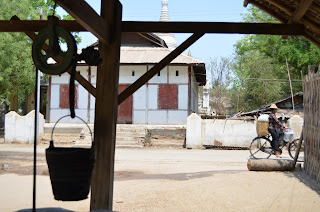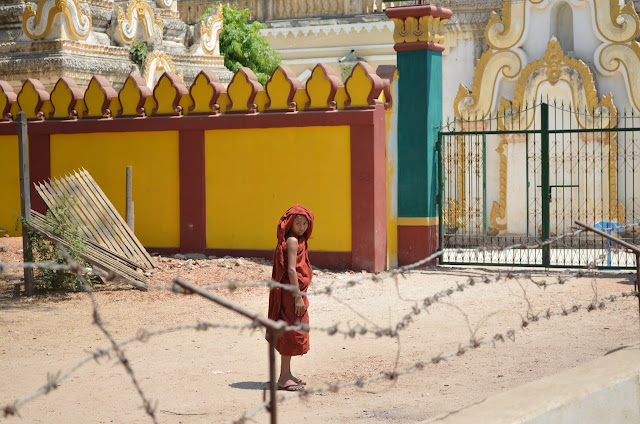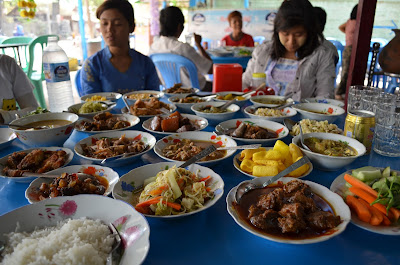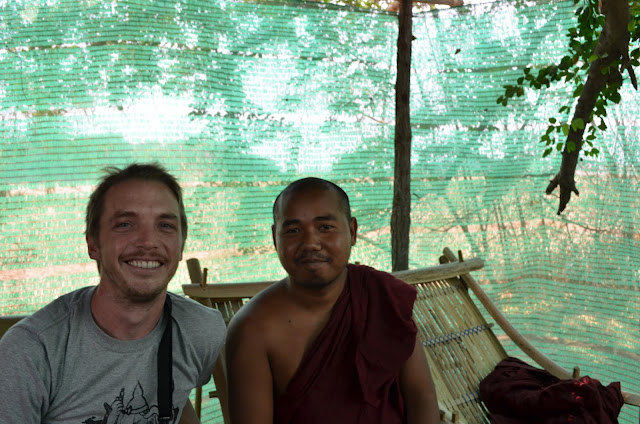 |
| A child selling fried goods on the dusty streets of Pakokku |
I walked through the streets of Pakkoku on my first day with
my shoulders squared and a purposeful forward-lurching gait. Of course I had no
idea where I was going, but if I’d learned anything from my first solo trip abroad so many years ago--- where wide-eyed me got roped into a $60 cab ride,
locked into the backseat when I refused to pay, then finally handed over
everything in my wallet just so the unscrupulous driver wouldn’t call the police--- it
was to act as if you knew exactly where you were going at all times. I'd just gotten off a bus to shy,bemused double takes and only a few timid offers of "taxi" from men with rotting red, betel-stainded teeth and would soon learn that Pakokku had nothing at all to do with the seedier side of San Jose, Costa Rica.
 |
| The simple amenities of central Myanmar. |
As simple as the journey ended up being, I almost didn’t
make it there at all. Back in Bagan (some 150 K southish) I’d developed a
thirst for some real adventure after all the hawks, touts, and cons aplenty
around the 1000 or so-year-old temples. I couldn’t blame them for it. A buck is a buck and Myanmar is otherworldly poor. These characters were hardly pros anyhow. They were more likely to break into laughter while bartering than push the hard sell. And most were children. They hung around other temples that
were themselves a con, the Burmese government having recently constructed them to
apparently flesh the place out. Myanmar’s cultural Disneyland, taking cues from the Chinese tourism model (don't just have it, sell it!), but on a Burmese budget
Wanting to contrast this with my vision of real Myanmar, the idealistic trueness travelers everywhere seek to find, my heart set on some deep, lonesome travel, the type that
realistically could have only happened at least 20 years ago, I drove my rented
bike down to the banks of the Ayeyarwady River looking to see “a man about a
boat” as I put it to the first confused local I encountered. A crowd formed as
often does around confused foreigners in distant locales and after some
haggling I got the price down to 30,000 Kyat ( a little over $30) for the
journey. Still too pricey for my budget; I was staying in rooms for $1.50 a
night, harassed by mosquitios, vermin, and hemmed in by concrete walls --- all
that squalor and discomfort to waste it springing for a
two and a half hour boat ride on a dry-season depleted river. No thanks.
 |
| The morning markets. |
The bus was equivalent to a little over a night in my standard style suite and just as quick as the boat. Bus adventure! Almost as good. I was convinced. Finally getting to my riverside guesthouse I realized how lucky my penny-pinching decisions were. The river was bone-dry as far as the eye could see in both directions. People were using it as some sort of storage area for bags of grain and were also swimming in small water holes that had yet to be lost to the heat that rippled every horizon like a looming apocalypse. Giving simple temperatures, numbers, could never allow anyone a full grasp of the choking, and almost spectacular, heat that was rocking the country at this point. I trudged through it with hundreds of stares on my back and countless smiles.
 |
| A young monk, known as a novice, pauses to pose for the camera. |
 |
| Children at a temple excited to get their pictures taken. |
In every city of Myanmar, from touristed to off the beaten track, people retain this sense of wonder towards the traveller. Children wave and shout hello in most of Southeast Asia, but here grown men and women do as well, all seeming equally enamored and proud that someone is visiting their country. The inevitable pushback coming in future years will be sad to witness and maybe only a place as empty and beautifully forlorn as Pakokku may escape it.
Here even in a lively market packed with people, the atmosphere stops, or lurches slightly, as I enter the fold. This was a particularly sincere virtue of Pakkoku, the peculiar city of street corner water wells and Internet cafes, of traffic jams and oxcarts, of intelligent college graduates who had never even ventured as far as Yangon, itself a tepid reminder of Myanmar's stunted growth these past few decades. I walked the streets a daytime celebrity, offered homemade liquor (that looked like dishwater and tasted about the same) from midday alley boozers and photo ops from many who acted like they had yet to see a picture of themselves. Maybe they hadn't.
 |
| In the makeshift classroom after a 2-hour lesson on day one. |
Eventually I was approached by a man who seemed to be following me on a motorbike.
"I learn at an English school. Do you desire to go there?"
I smiled at his odd expression and what also amounted to a pretty decent understanding of English, one I hadn't been exposed to in a while.
" Yes," I said. " I do desire that."
The school sat riverside, or where the river used to be, and a joke I made on the stage in the picture to the left about going swimming absolutely killed(you had to be there). I taught an impromptu lesson, talked with Dude the monk and then was swarmed by adults and children with a litany of questions ranging from grammar points to extremely obscure vocabulary found in dog-eared copies of The Scarlett Letter and Oliver Twist. We went to lunch ( below), with the typical burmese fare--- soaked in oil.
 |
| In Myanmar, many restaurants simply place every single dish available on your table, then add up the cost of the dishes you've eaten. |
Their zeal for learning was really indescribable. I was not left alone for at least five hours straight. The monks kept ordering the young children to bring cups of well water as my throat was completely parched from continuously talking. I didn't tire, completely in awe of their enthusiasm. I've taught for years and have never seen anything like it. Adults and children, in a town where I and one other man arriving the next day were the only visitors, saw an opportunity to take advantage of and it was inspiring.
 |
| This is Dude, pronounced "Dooday". I saw a quote in one of the student's books saying something to the extent of "be peaceful and enjoy life--- Dude" and laughed thinking for a split second that it was somehow a reference The Big Lebowski. |
I left after three days and regretted it. Dude walked me out on my last day and wished me peace, luck, and happiness on my journey. Then before reaching the path leading out of the school,"Ok, go now. I don't want to say goodbye," he said and quickly spun around, heading back to the bamboo huts where I could hear students dutifully parroting verses from books written over a century ago. And that was the last I saw of the soft-spoken, affable monk of For Life Language School.
Reaching Mandalay, a behemoth by Myanmar's standards, I longed for the tiny, dusty lanes, the unassuming tea shops frequented by anyone with a moment's free time, the midday lulls in life when no one is stirring for the heat, for the guesthouse that was really just a house with extra rooms and a grandmother who fussed over me, for that balcony from which I watched the river not flow, for Dude beaming widely at his enthusiastic students, for the quizzical and guarded looks, for the friends I'd made.
 |
A note in my journal sums up my sentiment well: " Now in Mandalay, I feel I left Pakkoku too soon. But I suppose special little nowhere places will always pull at you more than larger ones."
|
